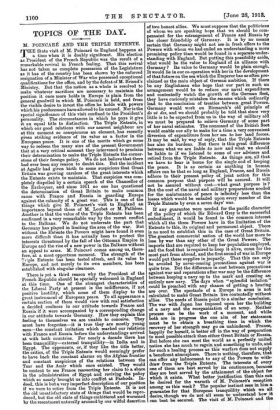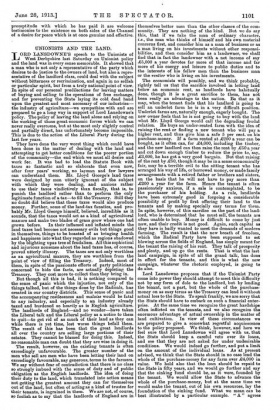TOPICS OF THE DAY.
M. POINCARg AND THE TRIPLE ENTENTE.
THE State visit of M. Poincare to England happens at a time when it is doubly significant. His election as President of the French Republic was the result of a
remarkable revival in French feeling. That this revival has not taken as complete possession of the Legislature as it has of the country has been shown by the enforced
resignation of a Minister of War who possessed exceptional qualifications for the office, and by the defeat of M. Briand's
Ministry. But that the nation as a whole is resolved to make whatever sacrifices are necessary to maintain the position it once more holds in Europe is plain from the
general goodwill in which M. Poincare is held, and from
the visible desire to invest the office he holds with powers which his predecessors have allowed to lie unused. Nor is the special significance of this visit confined to the President's personality. The circumstances in which he pays it give it an equal title to distinction. The Triple Entente, in
-which our good relations with our nearest neighbour are at this moment so conspicuous an element, has recently given striking evidence of its value as a factor in the European peace. It is one of the merits which go some way to redeem the many sins of the present Government that at a very critical moment they intervened to proclaim their determination to make the Triple Entente the corner- stone of their foreign policy. We do not believe that there had ever been any reason to doubt this. But the incident at Agadir had given birth to some suspicions that Great Britain was growing careless of the great interests which the Entente exists to maintain. That suspicion was com- pletely dispelled by a certain speech of the Chancellor of the Exchequer, and since 1911 no one has questioned the determination of Great Britain to make common cause with France and Russia in guarding Europe against the calamity of a great war. This is one of the things which give M. Poincare's visit to England an importance beyond those of M. Loubet or M. Fallieres. Another is that the value of the Triple Entente has been confirmed in a very remarkable way by the recent conflict in the Balkans. We do not underrate the part that Germany has played in limiting the area of the war. But without the Entente the Powers might have found it even more difficult than it has actually been to protect the interests threatened by the fall of the Ottoman Empire in Europe and the rise of a new power in the Balkans without an appeal to arms. M. Poincare comes among us, there- fore, at a most opportune moment. The strength of the " Iple Entente has been tested afresh, and its value to Europe, and not merely to its own members, has been established with singular clearness.
There is yet a third reason why the President of the French Republic should be specially welcomed in England at this time. One of the strangest characteristics of the Liberal Party at present is the indifference, if not positive hostility, which some of them display to the great instrument of European peace. To all appearance a certain section of them would view with real satisfaction a decided coolness in our attitude towards France and Russia if it were accompanied by a corresponding change in our attitude towards Germany. How they explain this feeling to themselves we are unable to conceive. They must have forgotten—it is true they are mostly young men—the constant irritation which marked our relations with France and Russia before the understandings arrived at with both countries. For nearly a decade there has been tranquillity—external tranquillity—in India and in Egypt. The opponents, or, if they like the title better, the critics, of the Triple Entente would seemingly prefer to have back the constant alarms on the Afghan frontier and constant suspicions of the relations between the Tsar and the Amir which once existed. They would be content to see France reasserting her claim to a share in the administration of Egypt and reviving the policy which so nearly brought us into conflict at Fashoda. In- deed, this is but a very imperfect description of our position if we were to retire from the Triple Entente. It is not the old unsatisfactory state of things that would be repro- duced, but the old state of things embittered and worsened by the resentment naturally aroused by our wilful desertion
of two honest allies. We must suppose that the politicians of whom we are speaking hope that we should be com-
pensated for the estrangement of France and Russia by the closer friendship of Germany. It is by no means certain that Germany might not see in fresh offers to the
Powers with whom we had ended an understanding a more promising policy than would be found in a separate under- standing with England. But putting this possibility aside, what would be the value to England of an alliance with Germany ? Its value to Germany would be plain enough. It would lie in our co-operation with her in the development of that future on the sea which the Emperor has so often pro- claimed as the main object of German ambition. If there be any Englishmen who hope that our part in such an arrangement would be to reduce our naval expenditure and contentedly watch the growth of the German fleet, they have curiously mistaken the reasons which ordinarily lead to the conclusion of treaties between great Powers. Germany would work on Bismarck's old principle of do ut des, and we should probably be told that since very little is to be expected from us in the way of military aid we must be prepared to relieve Germany of some part of her naval estimates. The command of the British fleet would enable our ally to make for a time a very convenient diversion of expenditure from her sea to her land forces. It may be said, by way of reply, that the Triple Entente has also its burdens. But there is this great difference between what we are liable to now and what we should be liable to if we listened to some of our advisers and retired from the Triple Entente. As things are, all that we have to bear is borne for the single end of keeping the peace. It is as certain as anything in human affairs can be that so long as England, France, and Russia adhere to their present policy of joint action for this common purpose that purpose will be assured. It. will not be assured without cost—what great purpose is ? But the cost of the naval and military preparations needed for the maintenance of peace is infinitely less than the losses which would be entailed upon every member of the Triple Entente by even a seven days' war.
If any guarantee were needed for the pacific character of the policy of which Sir Edward Grey is the successful embodiment, it would be found in the common interest -which all the three Powers have in the limitation of the Entente to this, its original and permanent object. There is no need to establish this in the case of Great Britain. The greatest commercial nation of the world has more to lose by war than any other of the Great Powers. The imports that are required to keep her population employed, and the food that is required to keep it alive, come for the most part from abroad, and the first sound of war in Europe would put these supplies in jeopardy. That this can only be avoided by never-ceasing precautions against war is quite true. But the difference in cost between precautions against war and reparations after war may be the difference between keeping a navy up to the mark and creating an entirely new navy. The days when " splendid isolation " could be preached with any chance of getting a hearing are over. The spectacle of a Europe in arms is not calculated to make Great Britain live contentedly without allies. The needs of Russia point to a similar conclusion. The war with Japan has imposed upon her the building of a navy and the reorganization of an army. Neither process can be the work of a moment, and while both are in progress the one aim of her statesmen must be to obtain a breathing time in which the recovery of her strength may go on unhindered. Frauee, happily for herself, is better off in the way of preparation to meet possible attack than either Great Britain or Russia. But before she can meet the world as a perfectly united nation she has much to regain and something to undo, and for such a healing process as this warfare does not supply a beneficent atmosphere. There is nothing, therefore, that can offer any inducement to any of the Powers to with- draw from the Triple Entente. The interests of every one of them are best served by its continuance, because they are best served by the attainment of the object for which it exists. What better justification than this can be desired for the warmth of M. Poincare's reception among us this week ? The popular instinct sees in him a guarantee for that European tranquillity which we all desire, though we do not all seem to understand bow it can best be secured. The visit of M. Poincare and the promptitude with which he has paid it are welcome testimonies to the existence on both sides of the Channel of a desire for peace which is at once genuine and effective.



























































 Previous page
Previous page